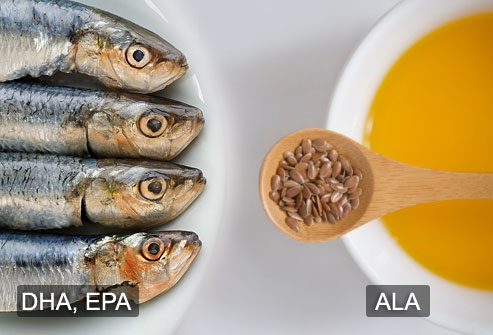
Important omega-3 fatty acids in nutrition are: α-linolenic acid (ALA), eicosapentaenoic acid (EPA), and docosahexaenoic acid (DHA). The human body cannot synthesize omega-3 fatty acids de novo, but can synthesize all the other necessary omega-3 fatty acids from the simpler omega-3 fatty acid α-linolenic acid that can be obtained from food.
Alpha-linolenic acid (ALA)
We usally get enough ALA from diet, like nuts, flax seed, canola, soybean oil.
Alpha-linolenic acid is an essential polyunsaturated fatty acids. It is the building block of EPA and DHA and thus the anti-inflammatory eicosanoids like PGE3 and LTB5. (see "Metabolic Pathway of Essential Fatty Acids").
Eicosapentanoic acid (EPA) and Doxosahexanoic acid (DHA)
Through a series of metabolic steps, ALA is converted to two other important omega-3 fatty acids, eicosapentaenoic acid (EPA) and docosahexaenoic acid (DHA). However, this process is usually slow, only a maximum of 15% of ALA ingested will be converted to EPA and even less, to DHA.
The following lifestyle and health problems may also influence or inhibit the conversion :
- High consumption of LA (Omega-6), saturated fat and trans-fat
- Smoking, stress, excessive intake of sugar or alcohol
- Diabetes, heart diseases, immune dysfunction, metabolic syndrome
- Deficiency of vitamins and minerals (e.g. vitamin B3, B6, C, zinc, and magnesium)
Therefore, it is not recommended to rely ALA as the source of EPA and DHA.
| Fish high in omega-3 fatty acids include salmon, mackerel, blueling, herring,sardines and tuna etc. Other marine life, such as krill and algae, also contain omega-3s. For non-fish lovers, fish oil supplements are a good alternatives for DHA and EPA. |  Blue Ling Fish
|
Benefits of EPA & DHA
DHA and EPA allow the central nervous system to develop properly and play a role in vision and brain development.

Through conversion to anti-inflammatory eicosanoids, DHA and EPA reduce inflammation, and help balance bad / good lipids. They also play a role in reducing blood aggregation and promote cardiovascular health. (See "Fish Oil and Fish Peptides" for more details.)
Side effects of EPA & DHA Fish Oil
Taking too much fish oil will lead to problems like excess caloric intake, stomach & gastrointestinal upset and increased risk of bleeding.(See "Fish Oil and Fish Peptides" for more details.)

